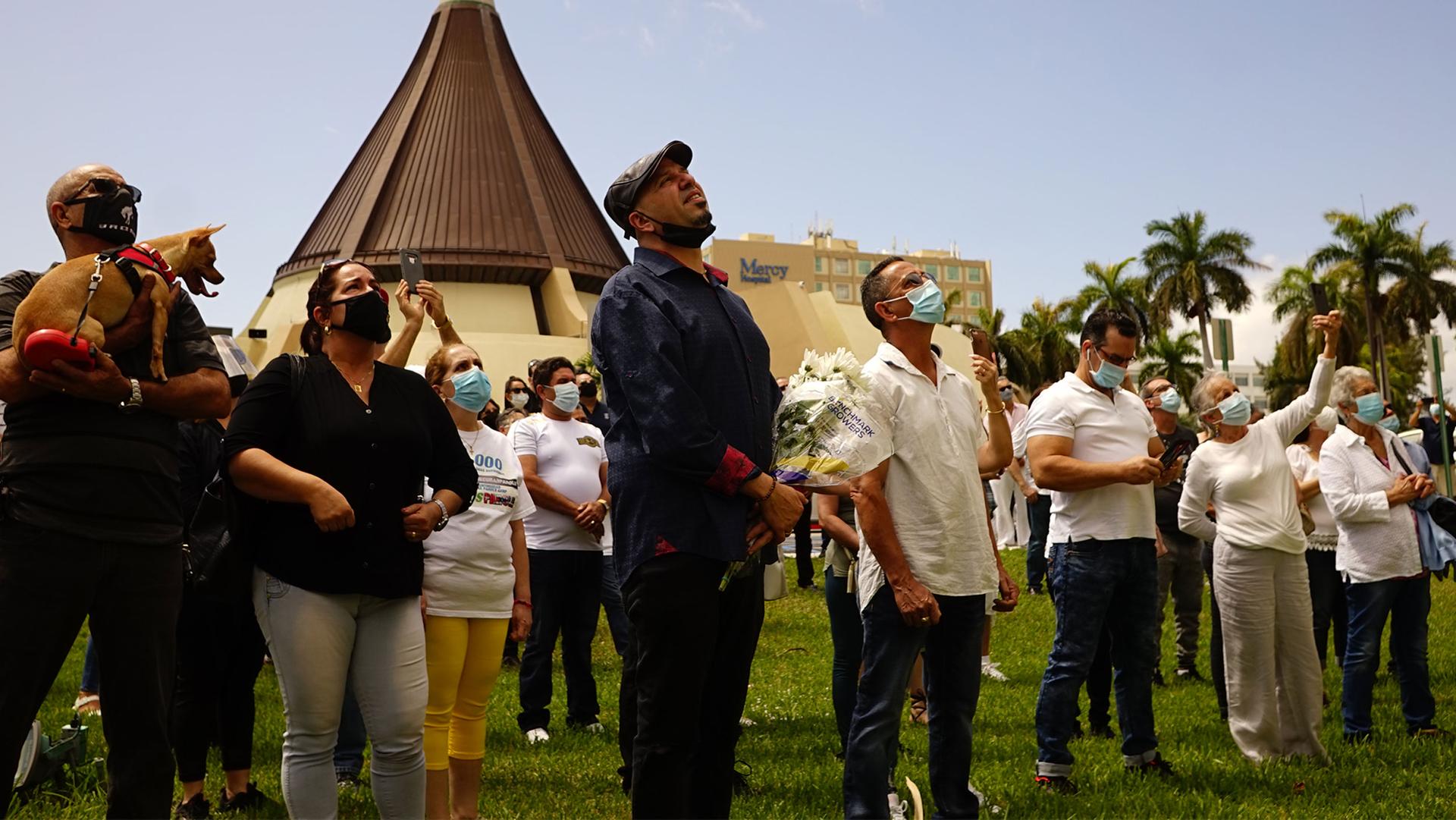In November 2019, about 40 people packed into a conference room at the Westchester Regional Library that sits at the heart of Miami-Dade’s suburban Cuban American community.
The group whispered among themselves and occasionally raised their voices in exasperation, seeking answers to a problem that continues to affect thousands of South Florida families to this day.
The topic of concern: the Cuban Family Reunification Parole Program. For years, the program has served as a straightforward, legal way to reunite Cuban families in the US.
Related: Biden slow to restore refugee admissions program
The issues with the program were complicated by geopolitics.
After staff at the US Embassy in Havana were mysteriously injured in what the US believes to be sonic attacks, the Trump administration all but shut down the embassy and removed staff at the end of 2017. And as the staff went away, all of the families that were enrolled in the program were left in limbo, with no one to conduct the necessary interviews and to process the piles of paperwork.
Related: From ‘aliens’ to ‘noncitizens’ — a Biden word change that matters
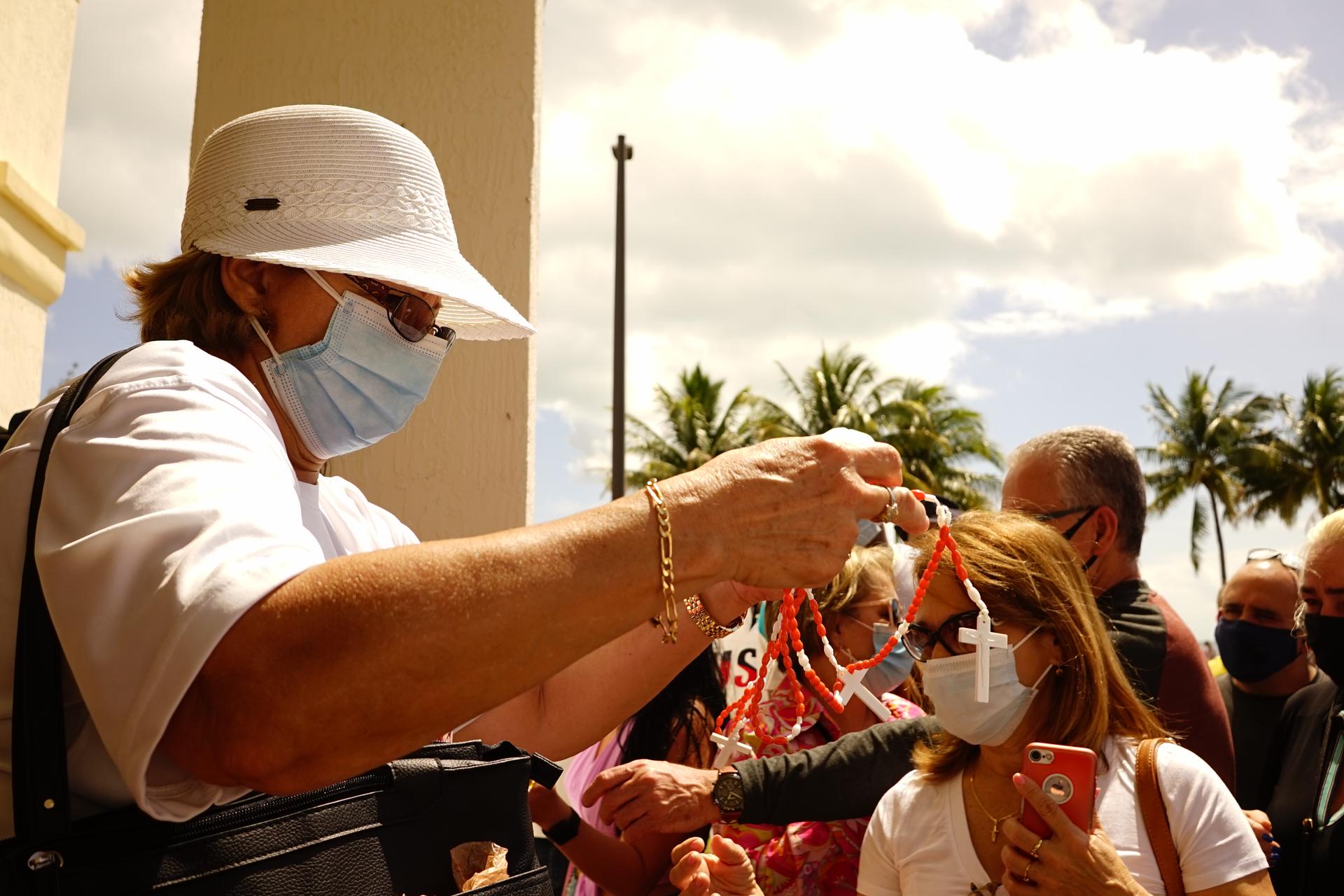
By 2019, the embassy was still largely shut down and families had been waiting years to reunite with their loved ones, with no end in sight.
“My family has been completely [torn] apart.”
“My family has been completely [torn] apart,” said Claudia Bringuier, who was 27 at the time. She arrived in the US at the age of 20 and had paid $2,000 to get her parents into the program.
“My parents get sick, and I get sick and I’m here by myself,” she said. “I’m lucky enough to have people I love and I want them with me. Some people maybe don’t have them, and don’t have this issue. I do.”
Bringuier is still waiting to reunite with her parents through the program.
Related: Immigration rights activists call on Biden to end private detention
The group gathered in Westchester to hear from two lawmakers, who were not of Cuban origin, but who nonetheless were seeking solutions to their concerns.
Then-Democratic Representative Debbie Mucarsel-Powell was sponsoring a bill that would have forced the State Department, under President Trump, to start processing the cases — through offering options like video conferencing. Then-Representative Donna Shalala co-sponsored the bill, and she was also present.
“We denounce the Cuban government, but let’s not punish the Cuban families that are suffering the consequences of that government.”
“We denounce the Cuban government, but let’s not punish the Cuban families that are suffering the consequences of that government,” said Mucarsel-Powell at the time. “There should be bipartisan support on this program. The [Trump] administration is not taking action, then we need to.”
“We are begging the administration officials to move these cases,” added Shalala. “This is not new immigration law. This is asking the administration to implement existing law.”
Related: Biden expands quick bid to undo Trump’s immigration policies
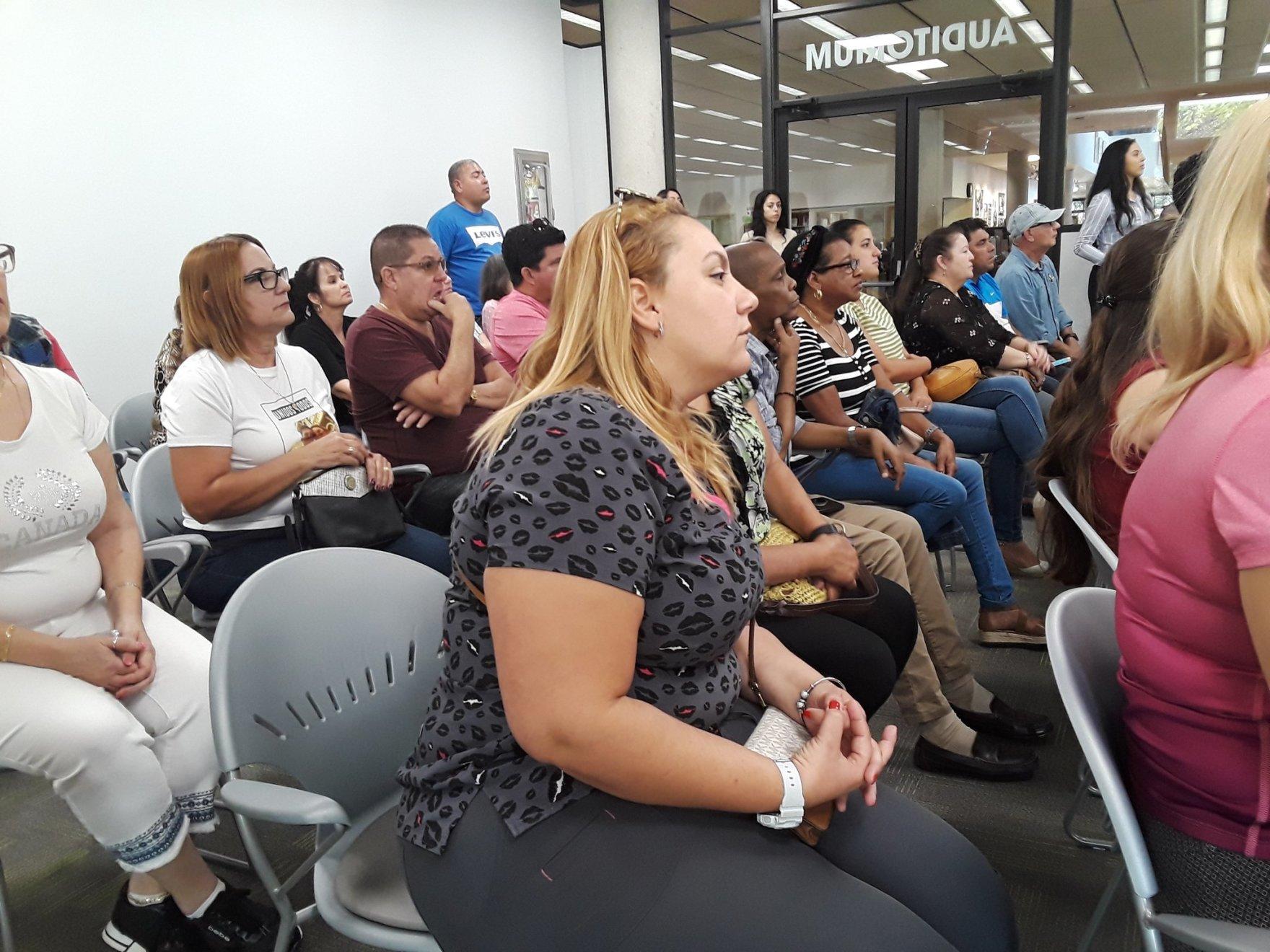
The law that created the Cuban Family Reunification Parole Program was signed in 2007 by former President George W. Bush.
The bill that would have forced the Trump administration to start working through the backlog of cases was introduced to the House of Representatives, but it never received any votes or even a committee hearing.
‘The years have gone by us’
With President Joe Biden in office now, some Cuban American families stuck in limbo are hoping that things will soon change. To date, an estimated 22,000 family reunification cases have been stuck in the immigration backlog, as basic services remain on hold at the US Embassy in Havana.
On a recent Sunday, dozens of Cuban families gathered at the Ermita de la Caridad National Shrine in Miami in a show of solidarity with one another, hoping to spur changes from the Biden administration.
“I claimed my son in March of 2016,” said Marietta Medialdea.
Medialdea held a heart-shaped box with a written plea to President Biden and a T-shirt featuring photos of her son. She came to the US in 2014 seeking liberty and said she never imagined the clearly-outlined legal process would still be dragging on. Her son was only 13 years old when she first claimed him, she said. Now, he is about to turn 18.
“We’re asking Biden to restart consular services in Cuba. We’ve done everything the way that they asked us to.”
“Right on the edge of them taking him to do his year of service in the Cuban military,” she said. Conscription for the military is mandatory in Cuba, something that keeps her up at night. “We’re asking Biden to restart consular services in Cuba. We’ve done everything the way that they asked us to,” she said.
Related: A therapists’ network supports immigrants, advocates during pandemic
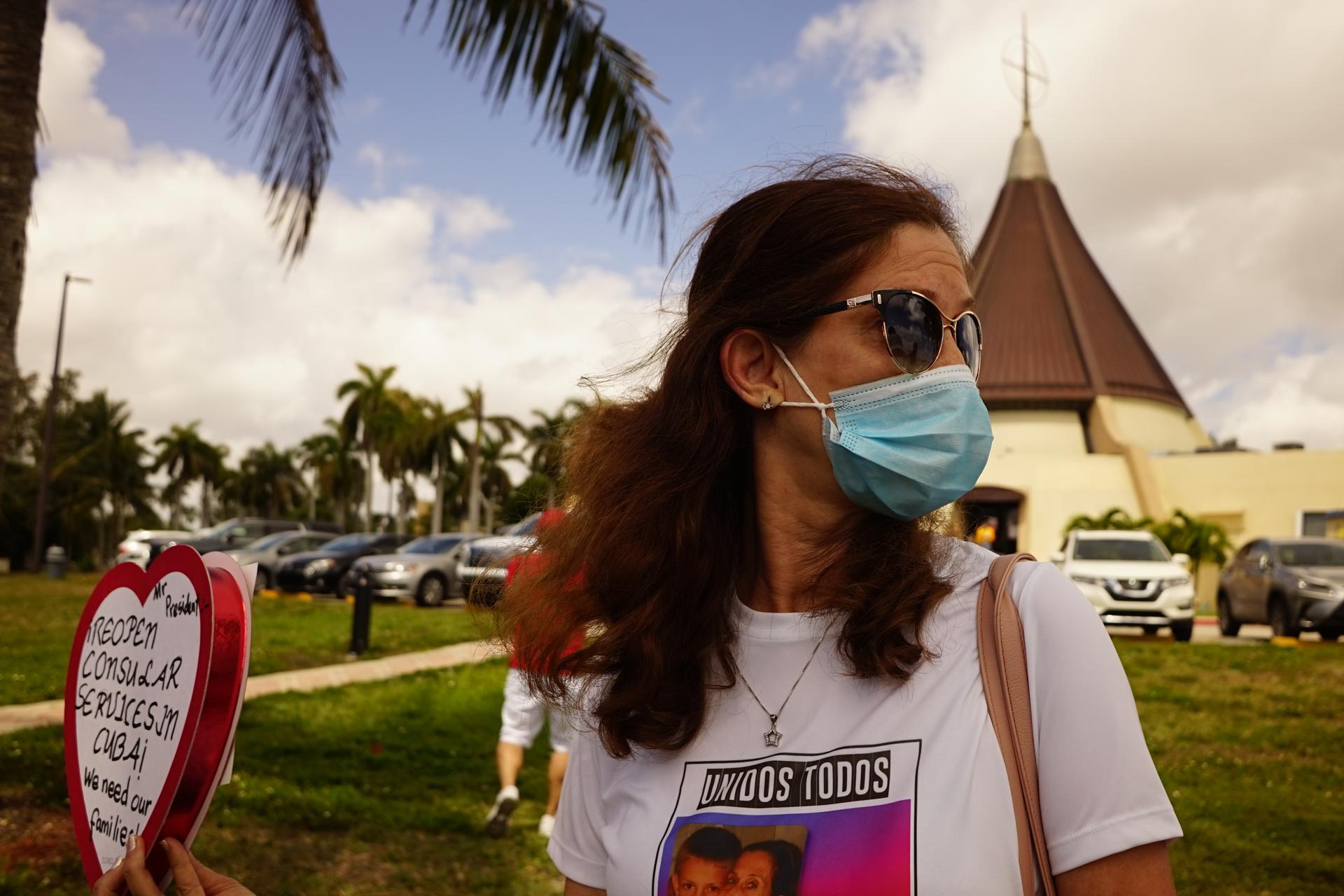
Without a functioning US Embassy in Cuba, the only way for her to be able to bring her son to Miami would be by setting up an interview for him at a US Embassy in a third country: Guyana.
But even this is off-limits for Medialdea. She can’t afford the trip.
“He’s a minor, so I would have to go with him,” she said. “That means two plane tickets, two mouths to feed, two everything.”
She whimpered in the arms of a friend while explaining her situation.
“The years have gone by us,” she cried.
The Robaina family came so close to reuniting with their loved ones.
“My family was at the embassy in Havana in 2017. They went on an interview, they were approved. They have a paper saying ‘Welcome to the United States of America,’ come back to pick your visa up next month.”
“My family was at the embassy in Havana in 2017. They went on an interview, they were approved. They have a paper saying ‘Welcome to the United States of America,’ come back to pick your visa up next month,” said Niubis Robaina, who is hoping to reunite with her cousin, aunt and uncle.
“They closed the embassy and all of their documents are in there. For over three years.”
Robaina harbors a small amount of optimism because the Biden administration seems more immigration-friendly than the previous administration.
“But at the same time, I don’t know what’s going to happen,” she said.
The impacted families have spent the last three years sending letters, calling members of Congress — of both political parties — and launching a social media campaign to bring awareness to their situation. Robaina has been active on all fronts, but now watches the Biden administration move forward with other kinds of immigration reforms with a bit of unease.
“Right now they did everything for Venezuelans, for the people in Mexico — I am all for it. I want immigration to happen to this country — I’m here and I’m a professional in this country because of it,” she said. “But I want it for my family, too. We did it legally. We paid thousands of dollars for it. We went to the lawyers. We waited for it. It’s not fair.”
An uptick in rafts to the US
In addition to the Cuban Family Reunification Parole Program cases that have been held up with a scaled-back US Embassy in Havana, more than 78,000 other immigrant visas from Cuba have been backlogged, bringing the total to more than 100,000 pending cases.
The Cuban government has accused the US of promoting illegal migration, through clandestine boat-smuggling networks, by not processing visas on the island.
The worsening economic conditions on the island, due to the coronavirus pandemic, increased US sanctions, newly created obstacles to sending remittances to the island and repressive Cuban economic policies, have formed a worrying cumulative effect.
Since October, 152 Cubans have been intercepted on the water en route to the US, according to the US Coast Guard. In the previous fiscal year, there were only 49 interceptions, although those numbers might have been impacted by the coronavirus pandemic.
The uptick is notable, but still far below years past. For instance, 1,468 Cubans were intercepted in 2017, and 5,396 in 2016.
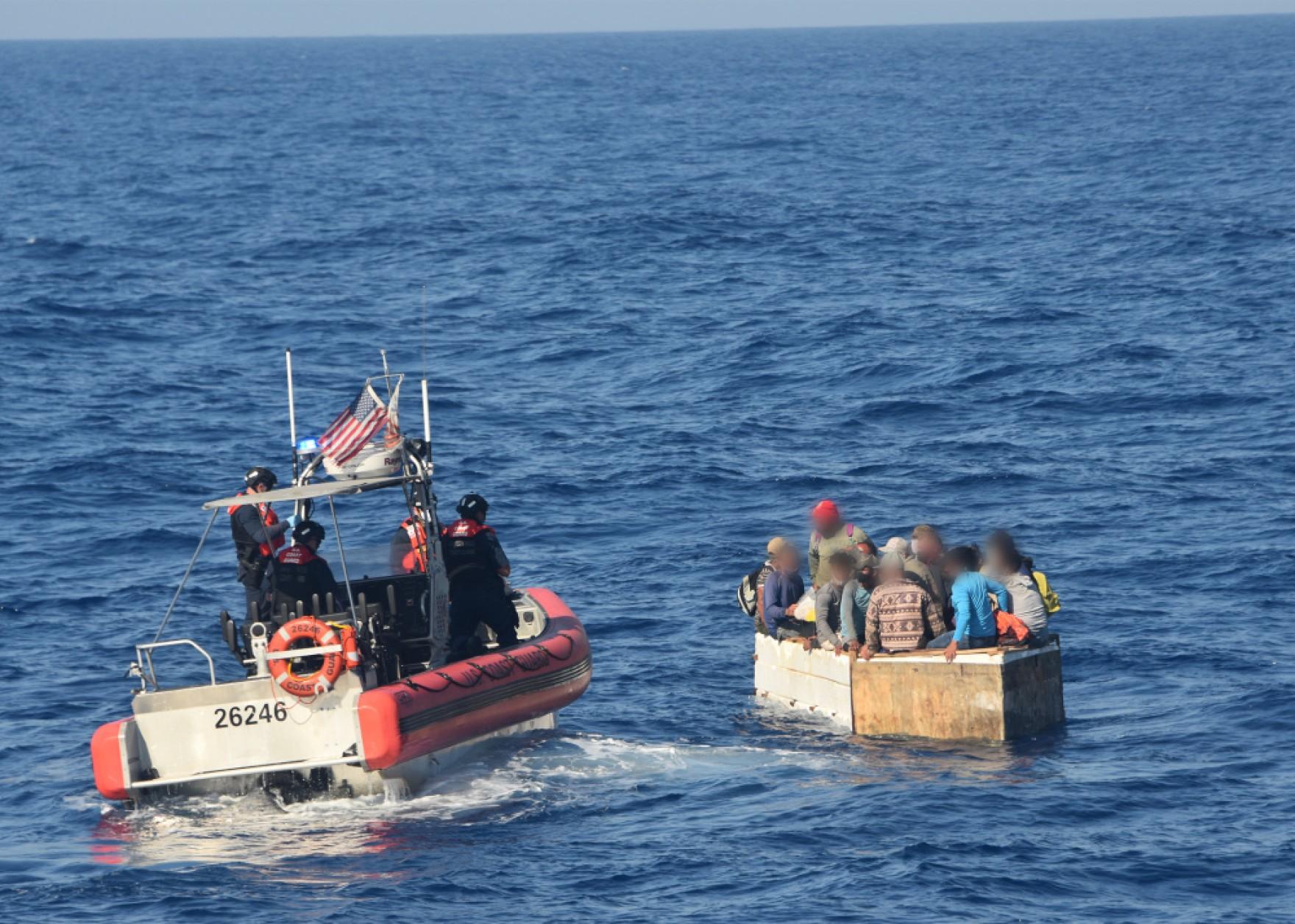
Some boats have quietly made it to Florida’s shores, and others have not been so lucky.
One boat originating from northern Cuba and bound for the US was capsized in the Bahamas in March, resulting in at least one death and many missing passengers. Another raft just off the coast of Martin County, Florida, capsized in February, although everyone survived.
Also in March, federal agents arrested four people in the Florida Keys under charges that they were running a migrant-trafficking operation from Cuba, based out of Key Largo and Homestead. The alleged operators were charging up to $10,000 per-person for the trip, according to court records.
Cuba ‘simply cannot be trusted’ to keep embassy safe
In a statement to WLRN, the State Department said it cannot provide a date when consular services in Havana might return to normal. In the meantime, any Cuban wishing to get a visa to come to the US should proceed to the designated third-country embassy in Guyana, said the department.
Florida Senator Marco Rubio said in a statement to WLRN that any potential threat of mysterious sonic attacks need to be put in place before the regular consular services can resume on the island.
“While I understand the importance of the Cuban Family Reunification Parole Program in helping Cuban families reunite, the Cuban regime has proven that it simply cannot be trusted with our diplomatic corps’ well-being and safety.”
“While I understand the importance of the Cuban Family Reunification Parole Program in helping Cuban families reunite, the Cuban regime has proven that it simply cannot be trusted with our diplomatic corps’ well-being and safety,” said Rubio.
“The customary functions of the US Embassy in Havana cannot return to normal as long as our diplomats, who assist with these applications, remain at risk of direct attacks. The Cuban regime is either conducting these attacks themselves or allowing them to continue in violation of their international treaty commitments.”
Former Democratic Representative Joe Garcia said that clearly “something happened” at the embassy and the US still needs to get answers. But he fears the attacks were capitalized upon by Republicans like Rubio and Trump, who opposed the 2015 normalization of diplomatic relations with Cuba in the first place, long before the mysterious attacks.
“The Trump administration in particular bungled the investigation, but used it as a pretext to further put pressure on Cuba and close this embassy. … This is what classically happens when rhetoric takes over policy.”
“The Trump administration in particular bungled the investigation, but used it as a pretext to further put pressure on Cuba and close this embassy,” said Garcia. “This is what classically happens when rhetoric takes over policy.”
The Biden administration has launched its own review of the mysterious suspected sonic attacks. Yet even if clear-cut answers about what happened are not learned through the review, Garcia said the current status quo of not offering any consular services in Havana is unsustainable for regular Cubans and Cuban American families.
Desperate families wanting to reunite are being left without viable options, he said.
“That you’re gonna make them travel to Guyana, spend two weeks there for processing, to then return to Cuba, to come to the United States, it just — it boggles the mind that we can’t find a better way to do this,” Garcia said.
A recent video posted to Twitter by the US Embassy in Havana pleads for Cubans not to take to the high seas in unsafe rafts in hopes of arriving in the United States.
“The government of the United States reminds you that taking to the seas in these inadequate rafts is illegal and extremely dangerous,” Lt. Cmdr. Mario Gil, the Coast Guard liaison officer at the embassy, says in the video.
“We ask you to use the pathways that are legal, secure and orderly to immigrate to the United States.”
Our coverage reaches millions each week, but only a small fraction of listeners contribute to sustain our program. We still need 224 more people to donate $100 or $10/monthly to unlock our $67,000 match. Will you help us get there today?
